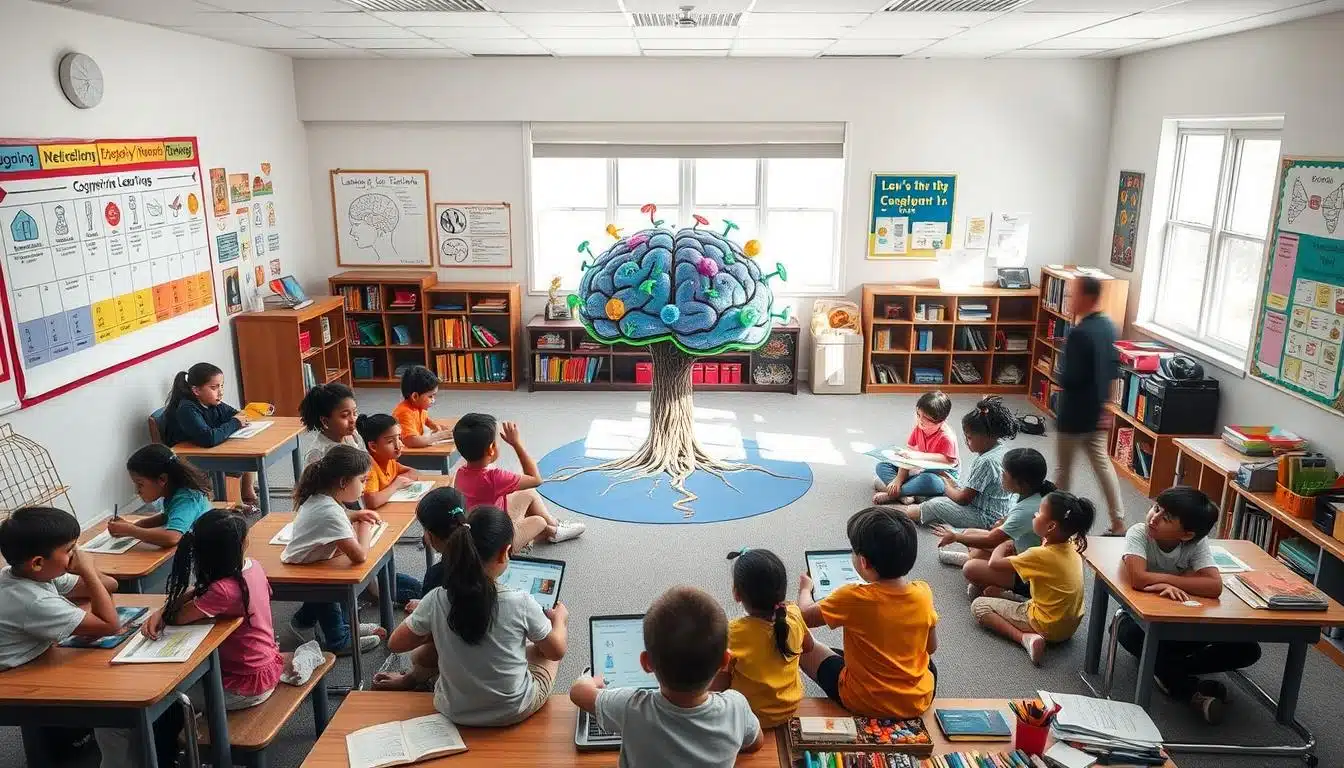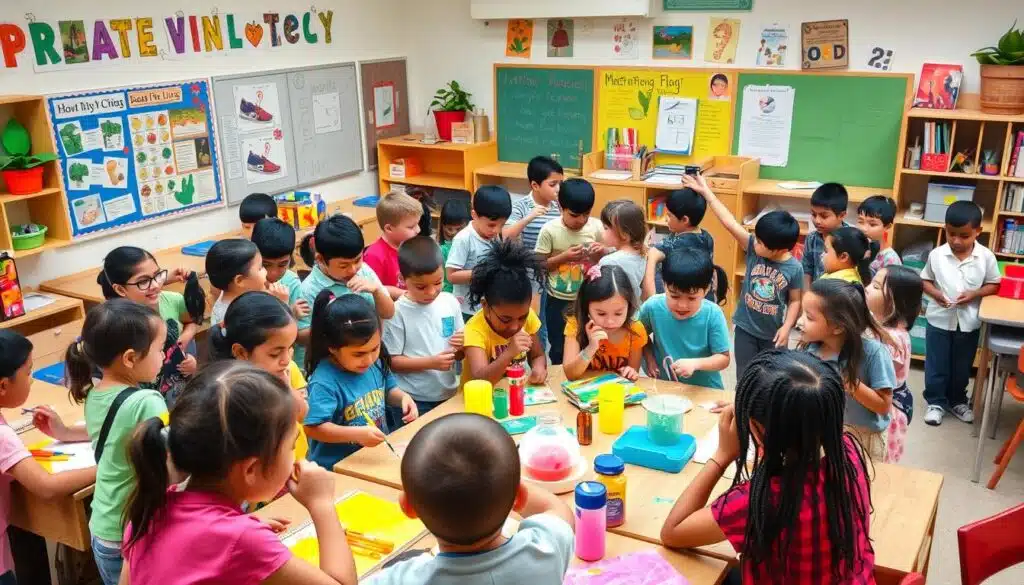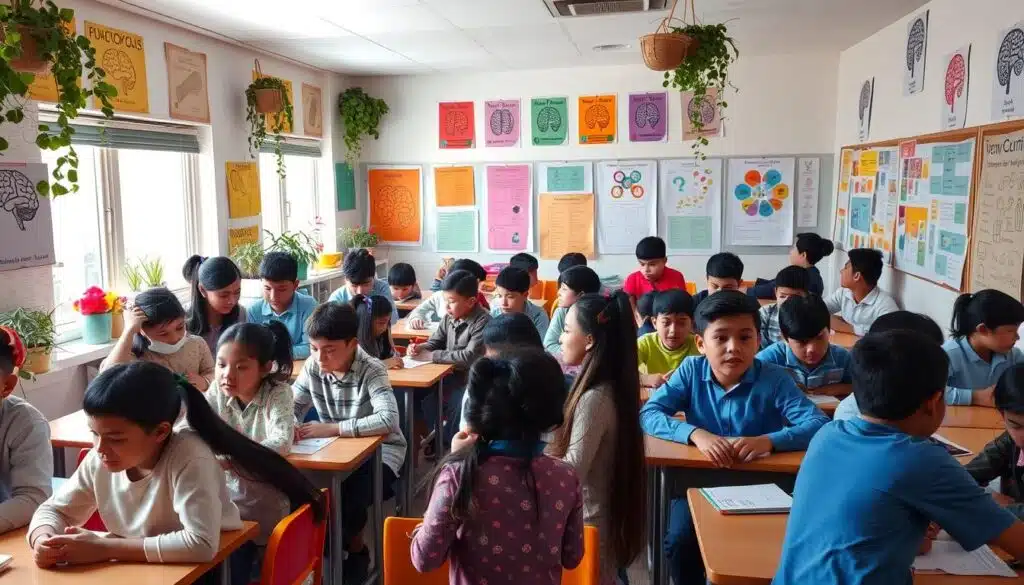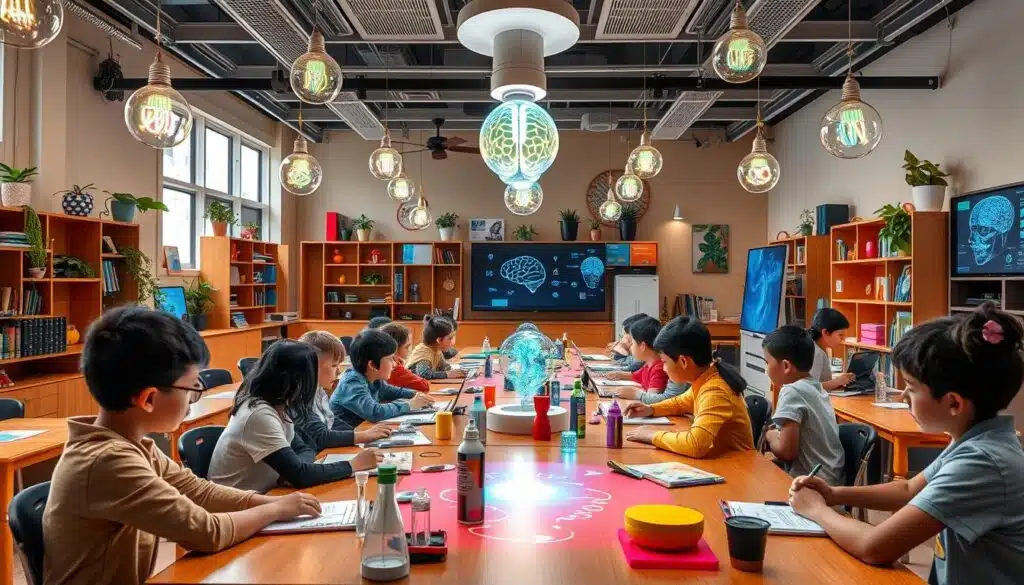Education sciences is a field that looks into how we learn and grow. It combines insights from psychology, sociology, and cognitive science. Researchers aim to make learning better by understanding how we develop cognitively.
This field is key to knowing how we get knowledge and skills. Education scientists study what shapes our minds, like brain function and our environment. Their work helps create new ways to teach and learn, preparing students for today’s world.
Key Takeaways
- Education sciences is a multidisciplinary field that examines the complex processes involved in learning and cognitive development.
- This field draws insights from various disciplines such as psychology, sociology, and cognitive science to inform effective educational practices and policies.
- Researchers in education sciences explore the factors that influence an individual’s cognitive development, including brain function, environmental influences, and pedagogical strategies.
- The knowledge gained from education sciences research is used to develop innovative educational programs and interventions that can support lifelong learning and prepare students for future success.
- The field of education sciences plays a crucial role in understanding the nuances of how people acquire knowledge, skills, and understanding, and in shaping the future of educational systems.
Introducing Education Sciences
Education sciences is a field that looks at how we learn and what affects our educational success. It combines psychology, cognitive science, sociology, and educational policy. It aims to understand how we get knowledge and skills, and how we learn. This helps make teaching better and improve schools.
What is Education Sciences?
Education sciences studies the science of learning and teaching. It looks at how our minds, schools, and other factors affect learning. Experts in this field study how our thoughts, social lives, and culture shape our ability to learn.
The Importance of Education Sciences in Cognitive Development
Education sciences is key because it helps us understand how to improve learning and thinking. By studying education and cognition, scientists help make learning better. Their work shapes education policies, school programs, and teaching methods, helping schools around the world.
“Education is the most powerful weapon which you can use to change the world.”
– Nelson Mandela
Cognitive Development Through Active Learning
Education sciences focuses on active learning. It means students are not just passive listeners. Instead, they actively participate, explore, and build their own knowledge. This method boosts cognitive development by encouraging critical thinking and deeper learning.
Researchers in education sciences look into different active learning methods. These include hands-on activities, group projects, and inquiry-based learning. They want to see how these strategies improve cognitive development and learning outcomes. The goal is to make students self-directed learners who can apply what they learn in many ways.
Vygotsky’s educational scaffolding theory says that working together with more knowledgeable people is key. This could be teachers or peers. It helps students grow in their ability to learn and understand more on their own.
By knowing each student’s learning level, educators can adjust their teaching. This makes learning more effective and prepares students for different educational systems and learning environments.
| Active Learning Strategies | Cognitive Development Benefits |
|---|---|
| Hands-on Activities | Promotes kinesthetic learning and problem-solving skills |
| Collaborative Projects | Fosters teamwork, communication, and critical thinking |
| Inquiry-based Learning | Encourages curiosity, research skills, and independent exploration |
By using active learning, education sciences helps improve cognitive development. It prepares the next generation of lifelong learners.
“The role of the teacher is to create the conditions for invention by revealing marvels and inspiring students to using their own talents.”
– Seymour Papert, Mathematician and Educator
Education Sciences and Student Learning Outcomes
Education sciences focus on understanding and measuring student learning outcomes. Researchers use various tools and methods to check if education works well. They look at how students learn, grow, and stay motivated.
Measuring Student Learning with Education Sciences
Experts in education sciences use different ways to measure learning. They use tests, performance checks, and portfolio reviews. These help teachers and leaders see if education programs work.
By looking at learning data, scientists find the best teaching methods. They help make learning better for everyone.
Enhancing Learning Experiences with Education Sciences
Education sciences also aim to make learning better for students. They use knowledge from psychology and design to improve teaching. This includes personalized learning and using technology in classrooms.
By linking research to real teaching, education sciences help teachers. They aim to make learning more engaging and effective for all students.
Interdisciplinary Approaches in Education Sciences
Education sciences combines many fields to understand how we learn. Experts from psychology, sociology, and more work together. They use different views to get a full picture of learning.
This teamwork helps us see how many things affect learning. They look at social, cultural, and environmental factors. This way, they find new ways to improve education.
Collaboration Between Disciplines in Education Research
Bringing together many fields is key in education research. Psychologists study how we think and act when we learn. Sociologists look at how society affects our education. Cognitive scientists explore how our brains learn and remember.
When these experts work together, they get a deeper understanding of learning. This teamwork helps find better ways to help students grow and succeed.
| Discipline | Contribution to Education Sciences |
|---|---|
| Psychology | Insights into cognitive and behavioral aspects of learning |
| Sociology | Understanding of sociocultural dynamics shaping educational outcomes |
| Cognitive Science | Expertise in neural mechanisms underlying learning and memory |
| Educational Policy | Insights into the development and implementation of educational policies and programs |
Through these partnerships, education sciences can find new ways to meet the needs of learners. This helps improve education for everyone.
The Future of Education Sciences
The field of education sciences is always changing. Researchers and teachers are looking into new trends and technologies to improve learning. Artificial intelligence (AI) in education is becoming more popular.
Emerging Trends and Technologies in Education Sciences
AI tools like adaptive learning platforms and intelligent tutoring systems are being studied. They can tailor lessons, give feedback, and adjust to each student’s needs. Generative AI models, like ChatGPT, are also being explored for creating educational content and assessments.
The Role of Artificial Intelligence in Education Sciences
As AI technology improves, education sciences will be key in studying its effects. This includes how it impacts learning and cognitive development. By using these technologies wisely, education sciences can help shape the future of learning and help students reach their goals.
- Many students struggle with basic skills due to overuse of electronic devices.
- Russian Math Tutors offers real-time, personalized math lessons and is developing an AI math tutor moderated by live tutors.
- Digital divide poses challenges for students without personal access to laptops or tablets.
- Libraries play a critical role in bridging the digital gap for students.
- Remote and hybrid learning models are becoming more popular.
- Critical thinking, digital literacy, and adaptability are vital skills for students in the evolving educational landscape.
- Policies need to be implemented to address the digital divide and support underprivileged students to ensure equal learning opportunities.
The University of Georgia got a five-year, $10 million grant from the Institute of Education Sciences. This grant is for a research center focused on generative artificial intelligence (GenAI) in schools. The team, led by Xiaoming Zhai, will study in middle schools across five states.
The National Center on Generative AI for Uplifting STEM+C Education (GENIUS Center) is a joint effort. It includes Vanderbilt University, Educational Testing Service, and Albany State University. GenAgent, a tool from the GENIUS Center, will help students and teachers with immediate feedback.
UGA faculty members working on the project include Yizhu Gao, Lehong Shi, and Ehsan Latif from the College of Education. Tianming Liu and Ninghao Liu are from the School of Computing. Xianqiao Wang is in the College of Engineering.
Also Read : Guide To Legal Education
Conclusion
The field of education sciences is always changing and very important. It helps us understand how we learn and grow. Education scientists use many areas of study to make learning better and help people grow in all ways.
They use new learning methods and technology to improve education. This includes using things like spacing and technology to help students learn. The University of Florida and other schools are leading the way in this research.
Education sciences will keep being key in the future. It will help create better learning experiences for everyone. This field is crucial for solving big problems in education and helping people succeed in their careers.
FAQs
Q: What is the Institute of Education Sciences (IES)?
A: The Institute of Education Sciences (IES) is a part of the U.S. Department of Education that focuses on providing rigorous evidence about education practices and policies through educational research, data collection, and analysis.
Q: What types of research areas are covered by the IES?
A: The IES covers various research areas, including early childhood education, postsecondary education, educational psychology, educational technology, and social sciences related to education.
Q: How can I access papers published in the journal related to education sciences?
A: You can access papers published in the journal by utilizing the journal menu or journal browser available on the IES website, where recent articles published are categorized by topics of interest.
Q: What is the impact factor of journals in educational research?
A: The impact factor of journals in educational research can vary; it measures the average number of citations to recent articles published in a specific journal, indicating its influence within the field.
Q: How does the IES support teacher training programs?
A: The IES supports teacher training programs through funding research initiatives, providing evidence-based resources, and developing training materials that enhance teacher education and pedagogy.
Q: What role does educational psychology play in education sciences?
A: Educational psychology plays a crucial role by studying how students learn and develop, which informs practices in teaching, curriculum design, and education policy to improve student outcomes.
Q: How has research in education changed over time according to recent studies?
A: Research in education has changed over time by increasingly focusing on data-driven decisions, the integration of technology in education settings, and an emphasis on social and emotional learning within educational practices.
Q: Where can I find information on educational technology advancements published in this journal?
A: Information on educational technology advancements published in this journal can be found by browsing the journal menu, which includes sections dedicated to articles related to the latest trends and research in educational technology.
Q: How does the IES contribute to education policy formulation?
A: The IES contributes to education policy formulation by conducting rigorous research studies, providing data analysis, and disseminating findings that inform policymakers about effective practices and strategies in education.
Q: What resources does the IES provide for researchers in social sciences?
A: The IES provides various resources for researchers in social sciences, including access to data sets, research publications, training programs, and opportunities for collaboration on educational research projects.









